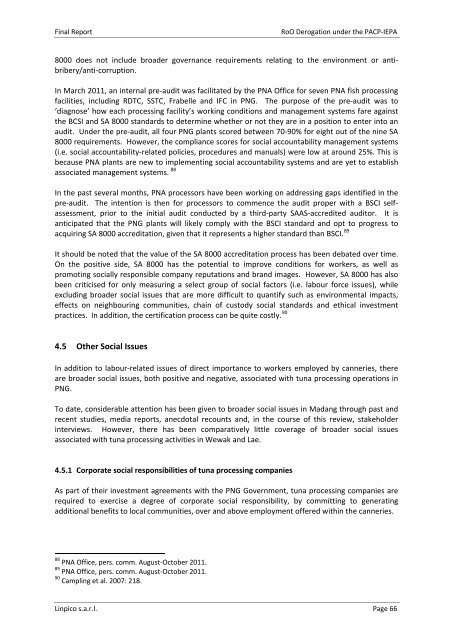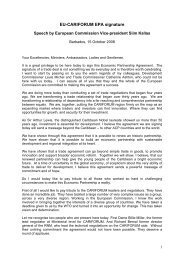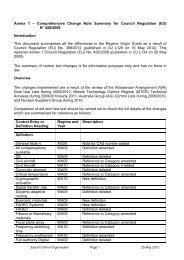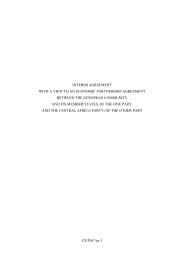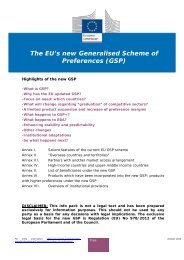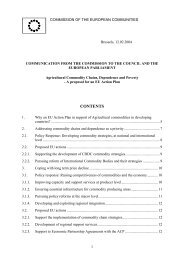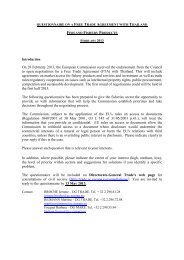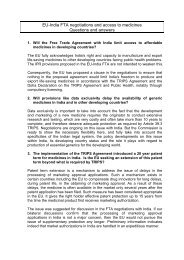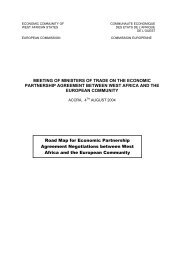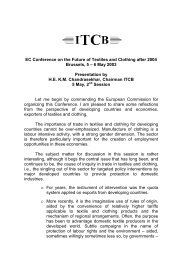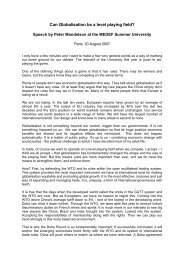Report on the Implementation of the derogation to ... - Trade Websites
Report on the Implementation of the derogation to ... - Trade Websites
Report on the Implementation of the derogation to ... - Trade Websites
You also want an ePaper? Increase the reach of your titles
YUMPU automatically turns print PDFs into web optimized ePapers that Google loves.
Final <str<strong>on</strong>g>Report</str<strong>on</strong>g><br />
RoO Derogati<strong>on</strong> under <strong>the</strong> PACP-IEPA<br />
8000 does not include broader governance requirements relating <strong>to</strong> <strong>the</strong> envir<strong>on</strong>ment or antibribery/anti-corrupti<strong>on</strong>.<br />
In March 2011, an internal pre-audit was facilitated by <strong>the</strong> PNA Office for seven PNA fish processing<br />
facilities, including RDTC, SSTC, Frabelle and IFC in PNG. The purpose <strong>of</strong> <strong>the</strong> pre-audit was <strong>to</strong><br />
‘diagnose’ how each processing facility’s working c<strong>on</strong>diti<strong>on</strong>s and management systems fare against<br />
<strong>the</strong> BCSI and SA 8000 standards <strong>to</strong> determine whe<strong>the</strong>r or not <strong>the</strong>y are in a positi<strong>on</strong> <strong>to</strong> enter in<strong>to</strong> an<br />
audit. Under <strong>the</strong> pre-audit, all four PNG plants scored between 70-90% for eight out <strong>of</strong> <strong>the</strong> nine SA<br />
8000 requirements. However, <strong>the</strong> compliance scores for social accountability management systems<br />
(i.e. social accountability-related policies, procedures and manuals) were low at around 25%. This is<br />
because PNA plants are new <strong>to</strong> implementing social accountability systems and are yet <strong>to</strong> establish<br />
associated management systems. 88<br />
In <strong>the</strong> past several m<strong>on</strong>ths, PNA processors have been working <strong>on</strong> addressing gaps identified in <strong>the</strong><br />
pre-audit. The intenti<strong>on</strong> is <strong>the</strong>n for processors <strong>to</strong> commence <strong>the</strong> audit proper with a BSCI selfassessment,<br />
prior <strong>to</strong> <strong>the</strong> initial audit c<strong>on</strong>ducted by a third-party SAAS-accredited audi<strong>to</strong>r. It is<br />
anticipated that <strong>the</strong> PNG plants will likely comply with <strong>the</strong> BSCI standard and opt <strong>to</strong> progress <strong>to</strong><br />
acquiring SA 8000 accreditati<strong>on</strong>, given that it represents a higher standard than BSCI. 89<br />
It should be noted that <strong>the</strong> value <strong>of</strong> <strong>the</strong> SA 8000 accreditati<strong>on</strong> process has been debated over time.<br />
On <strong>the</strong> positive side, SA 8000 has <strong>the</strong> potential <strong>to</strong> improve c<strong>on</strong>diti<strong>on</strong>s for workers, as well as<br />
promoting socially resp<strong>on</strong>sible company reputati<strong>on</strong>s and brand images. However, SA 8000 has also<br />
been criticised for <strong>on</strong>ly measuring a select group <strong>of</strong> social fac<strong>to</strong>rs (i.e. labour force issues), while<br />
excluding broader social issues that are more difficult <strong>to</strong> quantify such as envir<strong>on</strong>mental impacts,<br />
effects <strong>on</strong> neighbouring communities, chain <strong>of</strong> cus<strong>to</strong>dy social standards and ethical investment<br />
practices. In additi<strong>on</strong>, <strong>the</strong> certificati<strong>on</strong> process can be quite costly. 90<br />
4.5 O<strong>the</strong>r Social Issues<br />
In additi<strong>on</strong> <strong>to</strong> labour-related issues <strong>of</strong> direct importance <strong>to</strong> workers employed by canneries, <strong>the</strong>re<br />
are broader social issues, both positive and negative, associated with tuna processing operati<strong>on</strong>s in<br />
PNG.<br />
To date, c<strong>on</strong>siderable attenti<strong>on</strong> has been given <strong>to</strong> broader social issues in Madang through past and<br />
recent studies, media reports, anecdotal recounts and, in <strong>the</strong> course <strong>of</strong> this review, stakeholder<br />
interviews. However, <strong>the</strong>re has been comparatively little coverage <strong>of</strong> broader social issues<br />
associated with tuna processing activities in Wewak and Lae.<br />
4.5.1 Corporate social resp<strong>on</strong>sibilities <strong>of</strong> tuna processing companies<br />
As part <strong>of</strong> <strong>the</strong>ir investment agreements with <strong>the</strong> PNG Government, tuna processing companies are<br />
required <strong>to</strong> exercise a degree <strong>of</strong> corporate social resp<strong>on</strong>sibility, by committing <strong>to</strong> generating<br />
additi<strong>on</strong>al benefits <strong>to</strong> local communities, over and above employment <strong>of</strong>fered within <strong>the</strong> canneries.<br />
88 PNA Office, pers. comm. August-Oc<strong>to</strong>ber 2011.<br />
89 PNA Office, pers. comm. August-Oc<strong>to</strong>ber 2011.<br />
90 Campling et al. 2007: 218.<br />
Linpico s.a.r.l. Page 66


